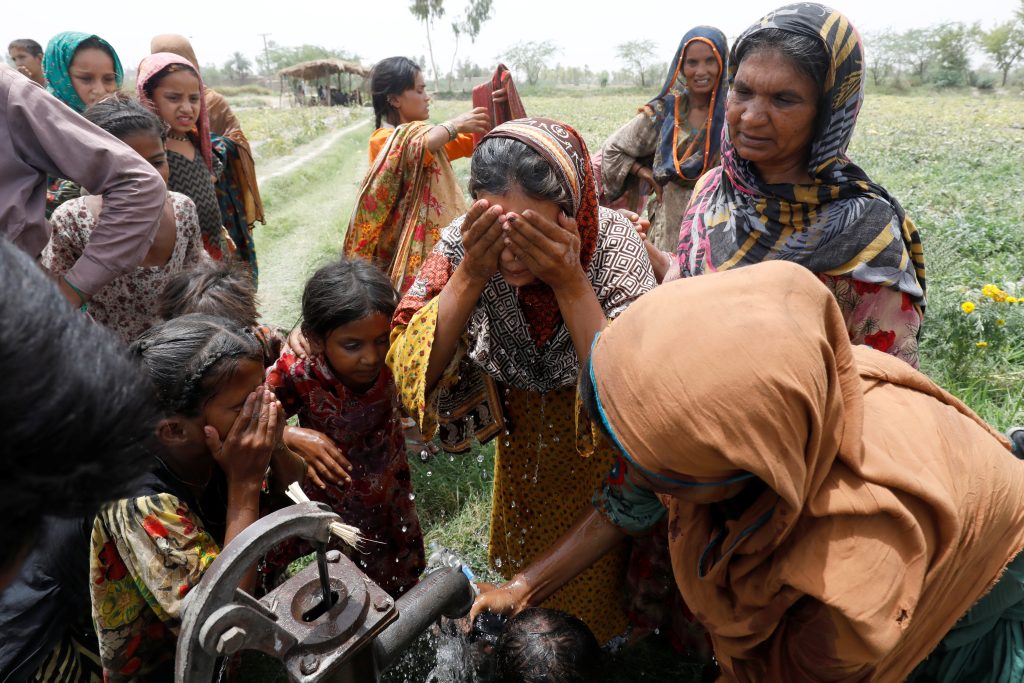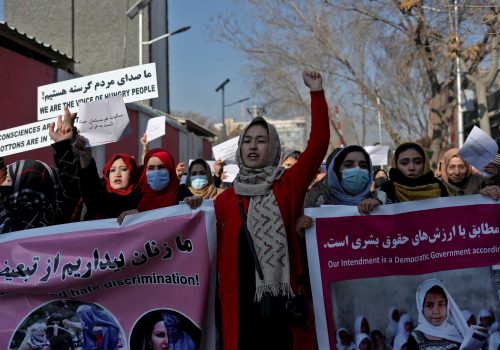Pakistan is far behind the curve in terms of women’s labor force participation. It ranks 145th of 146 countries on the Economic Participation and Opportunity Subindex of the World Economic Forum’s Global Gender Gap Report, focusing on workforce participation levels, salaries, and access to high-skilled employment. At 21 percent, women’s labor force participation in the nation is well below the 35 percent average for lower-middle-income countries.
With a growing economy and a young population, entrepreneurship is a crucial solution to create much-needed jobs while bringing more women into the labor force.
A field study of women entrepreneurs in urban Pakistan, commissioned by the South Asia Center of the Atlantic Council in conjunction with the School of Advanced International Studies at Johns Hopkins University and the American Pakistan Foundation, explored how technology solutions can support women to jumpstart their entrepreneurial ventures, promote their businesses, and facilitate financial transactions. The full report can be viewed here.
Digital access is crucial for entrepreneurship, and its importance is only expected to grow with time. Social media and e-commerce enable entrepreneurs to reach new customers and maintain links with existing ones, build their brands, and expand their networks. Productivity tools for communicating with vendors and employees, bookkeeping, and inventory management are increasingly digitized as well. However, there is a significant gender gap in access, and it is compounded for poorer, less-educated, and rural women.
Women entrepreneurs often lack business skills, education, experience, and access to networks in comparison to male peers. Women are also less likely to own bank accounts, take a business loan, and formally register their business, all of which hinder the business’ growth and success rate. The majority of women who do embark on entrepreneurial ventures rely on their own funds or borrow from a family member for startup capital. This naturally restricts access for women from lower-income socioeconomic strata.
In addition to these systemic barriers, women also face societal barriers, including limited agency in household decision-making, restrictions on mobility, and a disproportionate burden of household labor and unpaid care work.
A growing trend of “social media entrepreneurship” is leveling the playing field. Women are able to monetize their skills despite lacking access to business education and male-dominated professional networks. The study also revealed that the ability to run a business from home helps women to circumvent societal barriers and balance their household duties with work. However, in the long run, this increases the risk of entrenching the same regressive gender norms, thus serving as a potential barrier to further growth.
Nevertheless, increasing access to smartphones and the internet remains the most important lever to boost women’s engagement in entrepreneurship.
Making it easier for women to register for fintech products such as mobile wallets as well as promoting the adoption of mobile wallets can drive women’s entrepreneurship. Women who already have entrepreneurial ventures are found to be generally familiar with mobile wallets, which also indicates that these can be leveraged as an avenue to facilitate formal financial inclusion for these entrepreneurs. For instance, public sector banks can encourage women to use mobile wallet credit history to apply for a business loan.
In addition, most women entrepreneurs are unaware of business skill development and startup incubation programs currently being implemented in Pakistan. However, high penetration of social media indicates that these platforms are ideal channels for outreach and awareness generation. Direct linkages between social media platforms and women entrepreneurs can bring needed business skills where the women already are. One aspect of this linkage could also aim to encourage women from lower socioeconomic classes to diversify their presence on social media, encouraging them to take up platforms with wider reach and greater monetization potential.
In the long term, however, it is necessary to promote society-wide, gender-positive norms, and to gender-sensitize the business ecosystem as well as government and banking regulations.
All four authors are pursuing the Master of Arts in International Relations degree at the Johns Hopkins University School of Advanced International Studies. They took on this project as part of their final-year capstone requirements.
Fatimata Ndiaye is currently focusing on states, markets, and institutions, with a regional focus on Africa.
Ishani Srivastava is focusing on development, climate, and sustainability, with a regional focus on Asia.
Estelle Thomas has pursued numerous benevolent ventures as well as forefronted social justice student organizations, in parallel with her academic career.
Yiran Zhan is focusing on international economics and finance, as well as sustainable development.
This research was made possible by the generous support of Seema and Shuja Nawaz on behalf of the Pakistan Initiative of the South Asia Center and the American Pakistan Foundation, in partnership with the School of Advanced International Studies, Johns Hopkins University.
Shuja Nawaz is a distinguished fellow and the founding director of the South Asia Center of the Atlantic Council, Washington DC. His latest book is The Battle for Pakistan: The Bitter US Friendship and a Tough Neighbourhood. On Twitter: @ShujaNawaz

The South Asia Center is the hub for the Atlantic Council’s analysis of the political, social, geographical, and cultural diversity of the region. At the intersection of South Asia and its geopolitics, SAC cultivates dialogue to shape policy and forge ties between the region and the global community.
Related content
Image: Women and children wash themselves after work at a muskmelon farm, during a heatwave, at a hand pump on the outskirts of Jacobabad, Pakistan, May 17, 2022. Last month Jacobabad became the hottest city on Earth. Women are especially vulnerable to rising temperatures in poor countries on the frontlines of climate change because many have little choice but to work through their pregnancies and soon after giving birth, according to interviews with more than a dozen female residents in the Jacobabad area as well as half a dozen development and human rights experts. REUTERS/Akhtar Soomro SEARCH "SOOMRO PAKISTAN JACOBABAD" FOR THIS STORY. SEARCH "WIDER IMAGE" FOR ALL STORIES. TPX IMAGES OF THE DAY



